哈佛校长演讲
2024年哈佛大学毕业典礼致辞
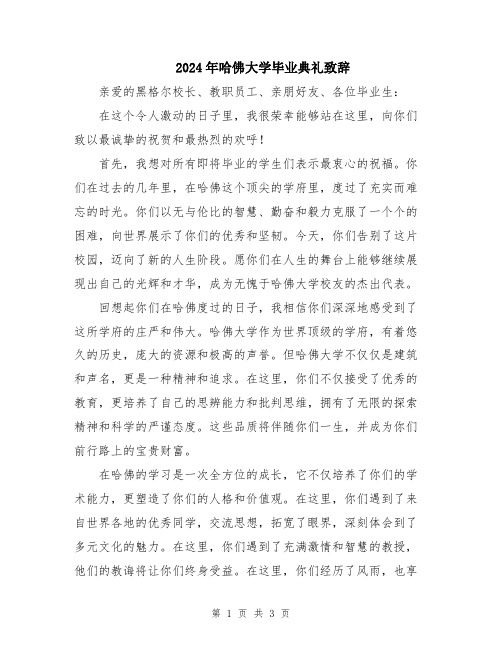
2024年哈佛大学毕业典礼致辞亲爱的黑格尔校长、教职员工、亲朋好友、各位毕业生:在这个令人激动的日子里,我很荣幸能够站在这里,向你们致以最诚挚的祝贺和最热烈的欢呼!首先,我想对所有即将毕业的学生们表示最衷心的祝福。
你们在过去的几年里,在哈佛这个顶尖的学府里,度过了充实而难忘的时光。
你们以无与伦比的智慧、勤奋和毅力克服了一个个的困难,向世界展示了你们的优秀和坚韧。
今天,你们告别了这片校园,迈向了新的人生阶段。
愿你们在人生的舞台上能够继续展现出自己的光辉和才华,成为无愧于哈佛大学校友的杰出代表。
回想起你们在哈佛度过的日子,我相信你们深深地感受到了这所学府的庄严和伟大。
哈佛大学作为世界顶级的学府,有着悠久的历史,庞大的资源和极高的声誉。
但哈佛大学不仅仅是建筑和声名,更是一种精神和追求。
在这里,你们不仅接受了优秀的教育,更培养了自己的思辨能力和批判思维,拥有了无限的探索精神和科学的严谨态度。
这些品质将伴随你们一生,并成为你们前行路上的宝贵财富。
在哈佛的学习是一次全方位的成长,它不仅培养了你们的学术能力,更塑造了你们的人格和价值观。
在这里,你们遇到了来自世界各地的优秀同学,交流思想,拓宽了眼界,深刻体会到了多元文化的魅力。
在这里,你们遇到了充满激情和智慧的教授,他们的教诲将让你们终身受益。
在这里,你们经历了风雨,也享受了阳光,学会了坚韧,也懂得了感恩。
这一切都使你们成熟起来,更加明确了自己的价值和责任。
2024年,是特殊的一年。
全球范围内爆发的COVID-19疫情让我们面临前所未有的挑战和考验。
可是,正是在这个特殊的时期,你们展现了非凡的勇气和坚韧。
你们顺应时代的呼唤,参与到抗击疫情的行动中,为社会做出了贡献,体现了哈佛大学学子的担当和使命感。
这一切都让我更加坚信,你们将成为未来的领军人物,为人类的进步和社会的发展贡献力量。
在这个动荡的时代,世界正发生着翻天覆地的变化。
科技的进步正在以前所未有的速度改变着我们的生活和工作方式。
一个人生活的广度决定优秀的程度哈佛校长演讲稿
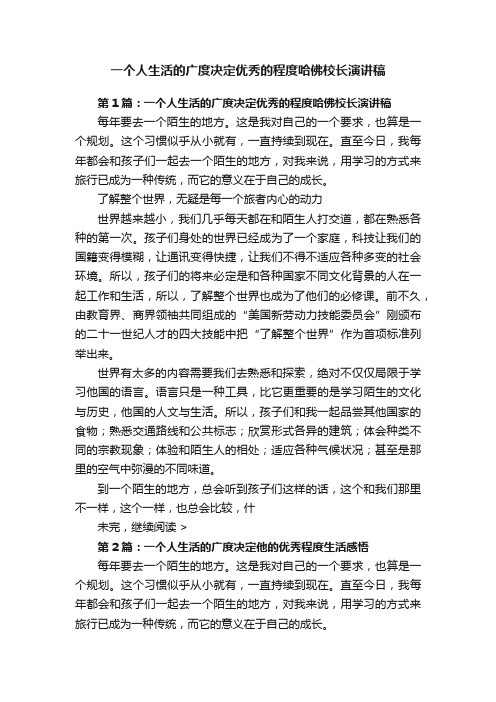
一个人生活的广度决定优秀的程度哈佛校长演讲稿第1篇:一个人生活的广度决定优秀的程度哈佛校长演讲稿每年要去一个陌生的地方。
这是我对自己的一个要求,也算是一个规划。
这个习惯似乎从小就有,一直持续到现在。
直至今日,我每年都会和孩子们一起去一个陌生的地方,对我来说,用学习的方式来旅行已成为一种传统,而它的意义在于自己的成长。
了解整个世界,无疑是每一个旅者内心的动力世界越来越小,我们几乎每天都在和陌生人打交道,都在熟悉各种的第一次。
孩子们身处的世界已经成为了一个家庭,科技让我们的国籍变得模糊,让通讯变得快捷,让我们不得不适应各种多变的社会环境。
所以,孩子们的将来必定是和各种国家不同文化背景的人在一起工作和生活,所以,了解整个世界也成为了他们的必修课。
前不久,由教育界、商界领袖共同组成的“美国新劳动力技能委员会”刚颁布的二十一世纪人才的四大技能中把“了解整个世界”作为首项标准列举出来。
世界有太多的内容需要我们去熟悉和探索,绝对不仅仅局限于学习他国的语言。
语言只是一种工具,比它更重要的是学习陌生的文化与历史,他国的人文与生活。
所以,孩子们和我一起品尝其他国家的食物;熟悉交通路线和公共标志;欣赏形式各异的建筑;体会种类不同的宗教现象;体验和陌生人的相处;适应各种气候状况;甚至是那里的空气中弥漫的不同味道。
到一个陌生的地方,总会听到孩子们这样的话,这个和我们那里不一样,这个一样,也总会比较,什未完,继续阅读 >第2篇:一个人生活的广度决定他的优秀程度生活感悟每年要去一个陌生的地方。
这是我对自己的一个要求,也算是一个规划。
这个习惯似乎从小就有,一直持续到现在。
直至今日,我每年都会和孩子们一起去一个陌生的地方,对我来说,用学习的方式来旅行已成为一种传统,而它的意义在于自己的成长。
“了解整个世界”无疑是每一个旅者内心的动力。
世界越来越小,我们几乎每天都在和陌生人打交道,都在熟悉各种的第一次。
孩子们身处的世界已经成为了一个家庭,科技让我们的国籍变得模糊,让通讯变得快捷,让我们不得不适应各种多变的社会环境。
哈佛大学校长DrewGilpinFaust清华演讲全文

哈佛大学校长Drew Gilpin Faust清华演讲全文尊敬的陈吉宁部长,陈旭书记,尊敬的老师们,同学们,朋友们:今天能够回到清华大学,就我们这个时代最紧迫的问题和大家交流想法,我感到非常荣幸。
我们在本世纪面临的最大挑战是气候变化以及致力于构造一个可持续、宜居住的世界。
今天,海平面上涨威胁着海岸线,日益频繁的旱灾不断改变生态系统,全球碳排放仍在持续增加。
有一句谚语,说种树最好的时机是二十年前,其次就是现在。
我七年前第一次访问清华时,曾和顾校长一起,种下一棵友谊树。
今天,我很高兴能够再次访问这个美丽的校园。
我知道,这里早在清代就是京城的园林名胜。
我也很高兴地看到,清华-哈佛友谊树已经成为我们众多领域的合作关系蓬勃发展的象征。
它比以往任何时候都更清晰地见证着我们的合作为世界创造的无限可能性。
正因为这样,我今天希望花一点时间,来讨论贵我两校这样的大学在应对气候变化的问题上能够发挥的特殊作用。
四个月以前,同样是在北京,习主席和奥巴马总统共同发表了《中美气候变化联合声明》(U.S.-China Joint Announcement on ClimateChange),承诺在未来二十年内限制美中两国温室气体的排放。
这是一项历史性的声明,它为世界最大的两个碳排放国设定了宏伟的目标,同时也标志着习主席和奥巴马总统希望通过它推动其他国家同样的行动。
其实,这两位领导人都是我们的校友:他们一位是清华化学工程和人文专业的毕业生,另一位毕业于哈佛法学院。
七年以前,甚至就在一年以前,我们都很难预见他们能够达成这样的共识。
然而,贵我两校数十年前就已经为它播下了种子。
我们培养了有能力把数月的讨论转化成国际性里程碑的领袖;我们超过二十年的气候分析合作为声明奠定了理论基础。
而这些事情,惟有大学才能做到。
美中联合声明的发表,对两国关系,乃至全世界的发展来说,都是一个重要时刻。
我们自然应该为这一时刻的到来感到欣慰。
中国一直以来为解决复杂的经济与环境问题做出着巨大的努力,这一点非常值得赞赏。
哈佛大学校长德鲁·福斯特在哈佛大学2023年毕业典礼英语演讲稿

哈佛大学校长德鲁·福斯特在哈佛大学2023年毕业典礼英语演讲稿IntroductionDear graduates, esteemed faculty, proud parents, and honored guests, it is my great pleasure to welcome you to the 2023 Harvard University commencement ceremony.We are gathered here today to celebrate the achievement of our graduates, who are receiving diplomas and degrees that represent their dedicated study and hard work over the past several years. This is also a moment to reflect on the meaning of education, on the value of learning, and on the importance of using our knowledge and skills to make a positive impact on the world.Embracing a Changing WorldAs we look out at the rapidly changing world around us, we see both immense challenges and incredible opportunities. Climate change, pandemics, economic inequality, and social injustice are just a few of the complex issues that our society must confront in the coming years. However, with these challenges come opportunities for innovation, collaboration, and progress.As graduates of Harvard University, you have been given a world-class education, and you are equipped with the skills, knowledge, and critical thinking abilities to make a positive impact on the world. You have the ability to create new technologies, to solve complex problems, and to work towards a more just and equitable society.The Importance of CharacterBut it is not enough to simply possess the skills and knowledge needed to make a difference. Equally important is the development of your character, your sense of purpose and integrity, and your commitment to making a positive impact on the world.As you embark on your post-graduation careers, I encourage you to be guided by a sense of purpose and a commitment to making a positive difference in the world. To be true leaders, you must embody the values of honesty, integrity, and empathy. You must be willing to take risks, to challenge existing norms, and to work towards a better future for all.Closing ThoughtsAs you leave Harvard University today, know that you are part of a long and proud tradition of scholarship, innovation, and leadership. You are part of a community of exceptional individuals who share a commitment to making a positive impact on the world.I wish you all the best as you begin the next chapter of your lives, and I encourage you to embrace the challenges that lie ahead, to remain guided by your sense of purpose, and to always use your education and skills to make a meaningful and positive impact on the world.Congratulations, Class of 2023!。
哈佛大学校长2023年开学演讲:你的名字 中英互译

Your Name你的名字Welcome, members of the Harvard College Class of 2027!哈佛大学2027届的同学们,欢迎你们!I am Claudine Gay, and I am your president.我是克劳丁·盖伊,你们的校长。
I am excited to be here and to mark with you the first moments of your official membership in our community.我很高兴在这里,与你们一起见证你们正式成为哈佛成员的重要时刻。
You’ve joined us from across the country and around the world. You’ve lived lives as varied as anyone could imagine, surmounted obstacles and reached goals, and defined part of who you are through intense focus, unceasing effort, and outstanding achievement.你们从全美各地和世界各地来到了这里。
你们精彩的人生超乎任何人的想象;你们克服困难、达成目标;高度的专注、不懈的努力和卓越的成绩让你们在某种程度上塑造了自己。
And now you are here.现在,你们终于来到这里了。
In this space, give yourselves permission to set aside thoughts of the past and designs on the future. Be present in this marvelous theatre. Take in every aspect of this experience. Let your joy and your pride win out.在这里,请你们允许自己把对过去的留恋和对未来的憧憬都先放到一边。
哈佛大学毕业典礼校长演讲稿(一)

哈佛大学毕业典礼校长演讲稿(一)哈佛大学毕业典礼是世界著名的毕业典礼之一,每年吸引着全球来自各个领域的优秀毕业生和各界人士的关注。
而毕业典礼的最高峰则是校长的演讲,其内容承载了哈佛大学的理念和对未来的展望。
那么,究竟在近年来的哈佛大学毕业典礼上,校长的演讲都谈了些什么呢?一、秉持激情和好奇心2019年的哈佛大学毕业典礼上,校长劳伦斯·巴科指出要坚持秉持激情和好奇心,这是追求知识和成长的必备品。
他以自己在哈佛大学学习经历为例,与毕业生分享了自己经历的“充满未知”的挑战以及面对困难的勇气和坚定。
二、鼓励勇敢尝试和跳出舒适圈在2018年的哈佛大学毕业典礼上,校长弗鲁斯特在演讲中提到,勇敢尝试和承担风险是成长中不可或缺的过程。
他激励毕业生:在生命中每个选择之前,不要忘记考虑自己可以做的最好的事情,同时也要毫不犹豫地跳出舒适圈。
三、重视创造力和创新发表于2017年的哈佛大学毕业典礼上,“创新和创造力”成为时下热门话题。
校长德鲁·法斯特为此与毕业生分享了多种有关创新的观点和理念,如鼓励毕业生寻找规律与破解现有困境,并引导说明:创新乃围绕着一种“关注”展开,关注人与世界的某个地方,并以把该地方变得更加先进为目标。
四、呼吁拥抱多元化和平等校长的演讲也常常涉及到社会发展和公共事务,2016年的哈佛大学毕业典礼便是以呼吁拥抱多元化和平等为主导方向。
校长德鲁尼斯在演讲中探讨了多元文化、鼓励大家跨越种族、宗教和性别差距,以创造一个更加平等和公正的世界。
他还分享了自己的经历,说明了多元化为人们带来的好处。
五、鼓励付出和回馈从2015年的哈佛大学毕业典礼到2020年的毕业典礼,秉持着社会责任和家国情怀的校长基尔德有着重要的话题,多围绕着“付出和回馈”展开,他通过分享自己和家族的经历,强调了付出和回馈、捐助和志愿活动对社会的重要意义,并呼吁毕业生主动关注社会的需要,以行动来回报社会,以建立更加有意义的人生。
名人演讲稿哈佛大学校长劳伦斯·萨默斯教授在北京大学的演讲(精简版)
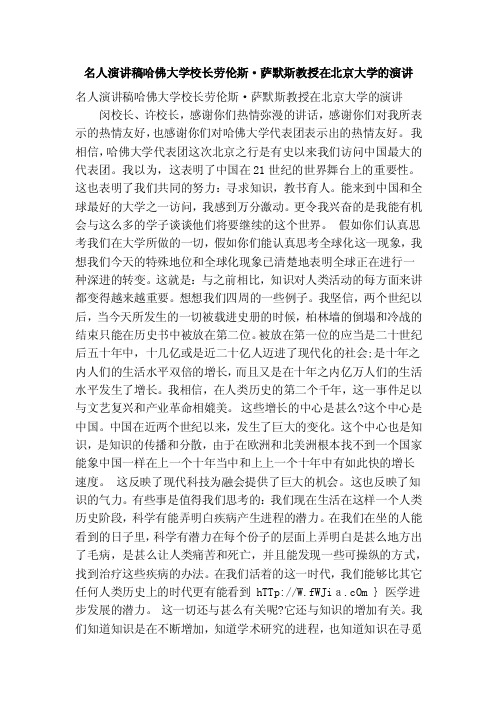
名人演讲稿哈佛大学校长劳伦斯·萨默斯教授在北京大学的演讲名人演讲稿哈佛大学校长劳伦斯·萨默斯教授在北京大学的演讲闵校长、许校长,感谢你们热情弥漫的讲话,感谢你们对我所表示的热情友好,也感谢你们对哈佛大学代表团表示出的热情友好。
我相信,哈佛大学代表团这次北京之行是有史以来我们访问中国最大的代表团。
我以为,这表明了中国在21世纪的世界舞台上的重要性。
这也表明了我们共同的努力:寻求知识,教书育人。
能来到中国和全球最好的大学之一访问,我感到万分激动。
更令我兴奋的是我能有机会与这么多的学子谈谈他们将要继续的这个世界。
假如你们认真思考我们在大学所做的一切,假如你们能认真思考全球化这一现象,我想我们今天的特殊地位和全球化现象已清楚地表明全球正在进行一种深进的转变。
这就是:与之前相比,知识对人类活动的每方面来讲都变得越来越重要。
想想我们四周的一些例子。
我坚信,两个世纪以后,当今天所发生的一切被载进史册的时候,柏林墙的倒塌和冷战的结束只能在历史书中被放在第二位。
被放在第一位的应当是二十世纪后五十年中,十几亿或是近二十亿人迈进了现代化的社会;是十年之内人们的生活水平双倍的增长,而且又是在十年之内亿万人们的生活水平发生了增长。
我相信,在人类历史的第二个千年,这一事件足以与文艺复兴和产业革命相媲美。
这些增长的中心是甚么?这个中心是中国。
中国在近两个世纪以来,发生了巨大的变化。
这个中心也是知识,是知识的传播和分散,由于在欧洲和北美洲根本找不到一个国家能象中国一样在上一个十年当中和上上一个十年中有如此快的增长速度。
这反映了现代科技为融会提供了巨大的机会。
这也反映了知识的气力。
有些事是值得我们思考的:我们现在生活在这样一个人类历史阶段,科学有能弄明白疾病产生进程的潜力。
在我们在坐的人能看到的日子里,科学有潜力在每个份子的层面上弄明白是甚么地方出了毛病,是甚么让人类痛苦和死亡,并且能发现一些可操纵的方式,找到治疗这些疾病的办法。
2024年哈佛毕业典礼扎克伯格致辞
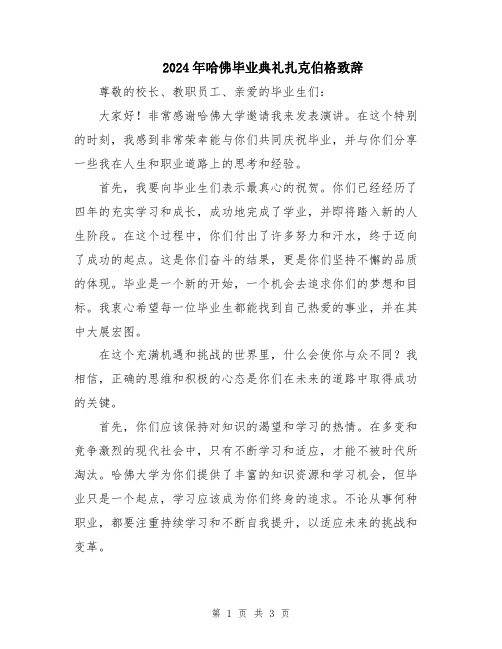
2024年哈佛毕业典礼扎克伯格致辞尊敬的校长、教职员工、亲爱的毕业生们:大家好!非常感谢哈佛大学邀请我来发表演讲。
在这个特别的时刻,我感到非常荣幸能与你们共同庆祝毕业,并与你们分享一些我在人生和职业道路上的思考和经验。
首先,我要向毕业生们表示最真心的祝贺。
你们已经经历了四年的充实学习和成长,成功地完成了学业,并即将踏入新的人生阶段。
在这个过程中,你们付出了许多努力和汗水,终于迈向了成功的起点。
这是你们奋斗的结果,更是你们坚持不懈的品质的体现。
毕业是一个新的开始,一个机会去追求你们的梦想和目标。
我衷心希望每一位毕业生都能找到自己热爱的事业,并在其中大展宏图。
在这个充满机遇和挑战的世界里,什么会使你与众不同?我相信,正确的思维和积极的心态是你们在未来的道路中取得成功的关键。
首先,你们应该保持对知识的渴望和学习的热情。
在多变和竞争激烈的现代社会中,只有不断学习和适应,才能不被时代所淘汰。
哈佛大学为你们提供了丰富的知识资源和学习机会,但毕业只是一个起点,学习应该成为你们终身的追求。
不论从事何种职业,都要注重持续学习和不断自我提升,以适应未来的挑战和变革。
其次,你们应该具备创新思维和勇于尝试的勇气。
目前的世界正在飞速发展,每天都有新技术和新思维不断涌现。
要想在这个竞争激烈的时代中脱颖而出,你们需要有独立思考和创新能力。
不要惧怕失败,只有不断尝试和学会从失败中汲取经验教训,才能真正找到成功的方向。
正如史蒂夫·乔布斯所说:“创新是区别优秀和卓越的必要条件。
”相信自己的能力,敢于冒险和突破,去寻找新的机会和可能性。
此外,你们也应该培养良好的沟通和合作能力。
在现代社会中,没有一个人可以独自完成伟大的事业。
要想实现自己的目标,你们需要与他人合作,建立强大的团队,共同面对挑战并取得成功。
与人相处需要开放和谦卑的态度,要善于倾听和尊重他人的意见。
只有通过良好的沟通和合作,你们才能够互相支持和激发彼此的潜力,共同实现更大的成就。
哈佛大学校长德鲁福斯特毕业演讲稿
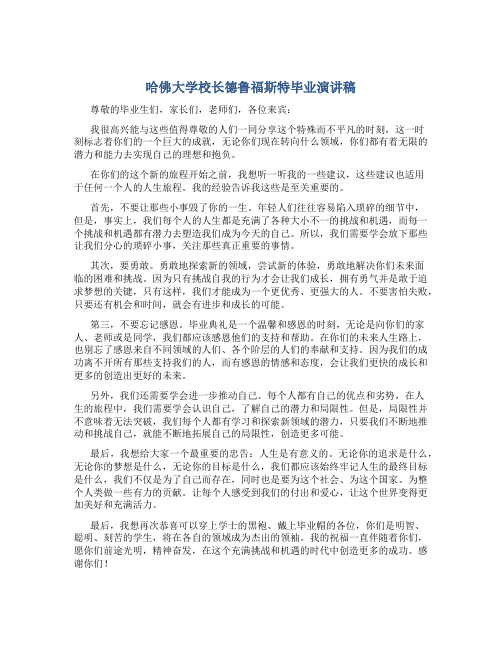
哈佛大学校长德鲁福斯特毕业演讲稿尊敬的毕业生们,家长们,老师们,各位来宾:我很高兴能与这些值得尊敬的人们一同分享这个特殊而不平凡的时刻,这一时刻标志着你们的一个巨大的成就,无论你们现在转向什么领域,你们都有着无限的潜力和能力去实现自己的理想和抱负。
在你们的这个新的旅程开始之前,我想听一听我的一些建议,这些建议也适用于任何一个人的人生旅程。
我的经验告诉我这些是至关重要的。
首先,不要让那些小事毁了你的一生。
年轻人们往往容易陷入琐碎的细节中,但是,事实上,我们每个人的人生都是充满了各种大小不一的挑战和机遇,而每一个挑战和机遇都有潜力去塑造我们成为今天的自己。
所以,我们需要学会放下那些让我们分心的琐碎小事,关注那些真正重要的事情。
其次,要勇敢。
勇敢地探索新的领域,尝试新的体验,勇敢地解决你们未来面临的困难和挑战。
因为只有挑战自我的行为才会让我们成长,拥有勇气并是敢于追求梦想的关键,只有这样,我们才能成为一个更优秀、更强大的人。
不要害怕失败,只要还有机会和时间,就会有进步和成长的可能。
第三,不要忘记感恩。
毕业典礼是一个温馨和感恩的时刻,无论是向你们的家人、老师或是同学,我们都应该感恩他们的支持和帮助。
在你们的未来人生路上,也别忘了感恩来自不同领域的人们、各个阶层的人们的奉献和支持。
因为我们的成功离不开所有那些支持我们的人,而有感恩的情感和态度,会让我们更快的成长和更多的创造出更好的未来。
另外,我们还需要学会进一步推动自己。
每个人都有自己的优点和劣势,在人生的旅程中,我们需要学会认识自己,了解自己的潜力和局限性。
但是,局限性并不意味着无法突破,我们每个人都有学习和探索新领域的潜力,只要我们不断地推动和挑战自己,就能不断地拓展自己的局限性,创造更多可能。
最后,我想给大家一个最重要的忠告:人生是有意义的。
无论你的追求是什么,无论你的梦想是什么,无论你的目标是什么,我们都应该始终牢记人生的最终目标是什么,我们不仅是为了自己而存在,同时也是要为这个社会、为这个国家、为整个人类做一些有力的贡献。
2024年哈佛校长毕业典礼致辞
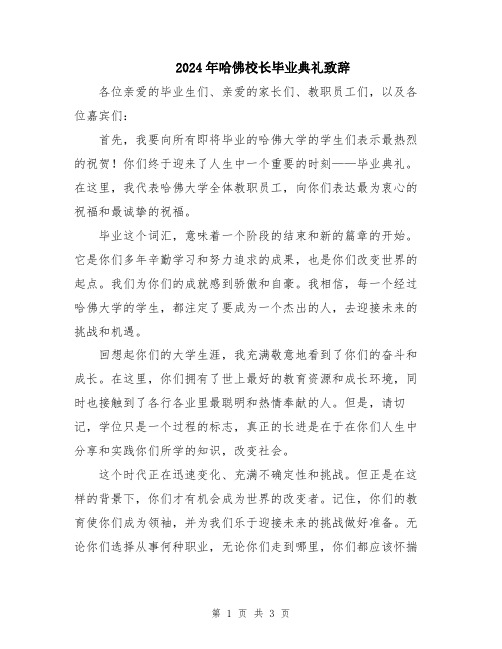
2024年哈佛校长毕业典礼致辞各位亲爱的毕业生们、亲爱的家长们、教职员工们,以及各位嘉宾们:首先,我要向所有即将毕业的哈佛大学的学生们表示最热烈的祝贺!你们终于迎来了人生中一个重要的时刻——毕业典礼。
在这里,我代表哈佛大学全体教职员工,向你们表达最为衷心的祝福和最诚挚的祝福。
毕业这个词汇,意味着一个阶段的结束和新的篇章的开始。
它是你们多年辛勤学习和努力追求的成果,也是你们改变世界的起点。
我们为你们的成就感到骄傲和自豪。
我相信,每一个经过哈佛大学的学生,都注定了要成为一个杰出的人,去迎接未来的挑战和机遇。
回想起你们的大学生涯,我充满敬意地看到了你们的奋斗和成长。
在这里,你们拥有了世上最好的教育资源和成长环境,同时也接触到了各行各业里最聪明和热情奉献的人。
但是,请切记,学位只是一个过程的标志,真正的长进是在于在你们人生中分享和实践你们所学的知识,改变社会。
这个时代正在迅速变化、充满不确定性和挑战。
但正是在这样的背景下,你们才有机会成为世界的改变者。
记住,你们的教育使你们成为领袖,并为我们乐于迎接未来的挑战做好准备。
无论你们选择从事何种职业,无论你们走到哪里,你们都应该怀揣着我所称之为“哈佛之魂”的东西,这是创造力、激情和责任感。
在这个时刻,我郑重地提醒每一位毕业生,对社会负责。
研究显示,在人们的一生中,每个人都会影响大约10000个人。
这个数字不仅适用于科学家、艺术家和领袖,而是对每个人而言都是如此。
无论你们选择从事何种职业,每个人都有能力改变世界,影响他人。
所以,请珍视这个能力,去追求你们内心最真诚的志向。
同时,我邀请你们保持好奇心和创新精神。
在这个快速变化的时代,只有不断学习和适应新事物,才能跟上时代的步伐。
你们是未来的领导者,是全球的创新者。
勇敢地追求你们的梦想和新的机遇,用你们的奇思妙想创造未来。
最后,我想对你们的家长们表示衷心的感谢。
感谢你们对孩子们的支持、鼓励和无私付出。
你们是孩子们最坚实的后盾,你们的辛勤工作和爱才让他们能够如此辉煌地站在这里。
哈佛大学校长的告别演讲(中英对照)
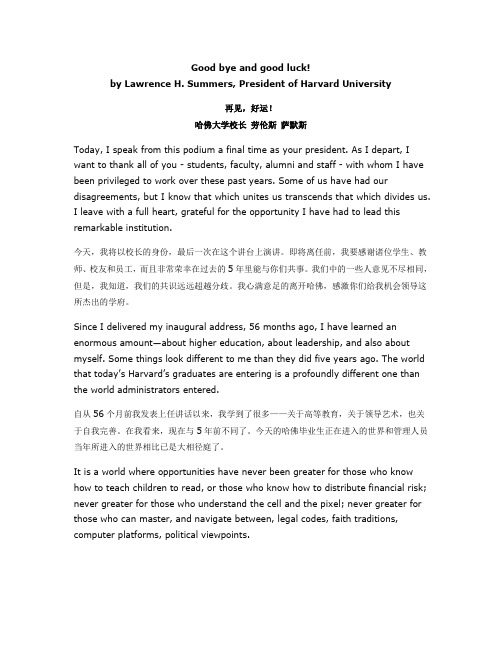
Good bye and good luck!by Lawrence H. Summers, President of Harvard University再见,好运!哈佛大学校长劳伦斯萨默斯Today, I speak from this podium a final time as your president. As I depart, I want to thank all of you - students, faculty, alumni and staff - with whom I have been privileged to work over these past years. Some of us have had our disagreements, but I know that which unites us transcends that which divides us.I leave with a full heart, grateful for the opportunity I have had to lead this remarkable institution.今天,我将以校长的身份,最后一次在这个讲台上演讲。
即将离任前,我要感谢诸位学生、教师、校友和员工,而且非常荣幸在过去的5年里能与你们共事。
我们中的一些人意见不尽相同,但是,我知道,我们的共识远远超越分歧。
我心满意足的离开哈佛,感激你们给我机会领导这所杰出的学府。
Since I delivered my inaugural address, 56 months ago, I have learned an enormous amount—about higher education, about leadership, and also about myself. Some things look different to me than they did five years ago. The world that today’s Harvard’s graduates are entering is a profoundly different one than the world administrators entered.自从56个月前我发表上任讲话以来,我学到了很多——关于高等教育,关于领导艺术,也关于自我完善。
哈佛大学校长德鲁·福斯特英文演讲稿:推动积极的变革和成长
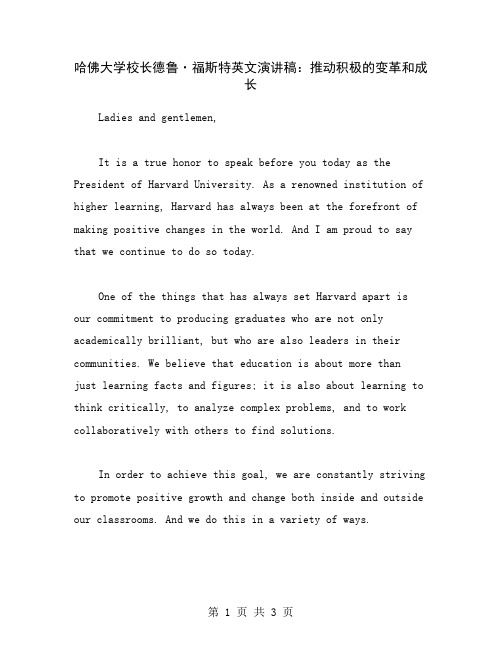
哈佛大学校长德鲁·福斯特英文演讲稿:推动积极的变革和成长Ladies and gentlemen,It is a true honor to speak before you today as the President of Harvard University. As a renowned institution of higher learning, Harvard has always been at the forefront of making positive changes in the world. And I am proud to say that we continue to do so today.One of the things that has always set Harvard apart is our commitment to producing graduates who are not only academically brilliant, but who are also leaders in their communities. We believe that education is about more thanjust learning facts and figures; it is also about learning to think critically, to analyze complex problems, and to work collaboratively with others to find solutions.In order to achieve this goal, we are constantly striving to promote positive growth and change both inside and outside our classrooms. And we do this in a variety of ways.First, we encourage our faculty to stay up-to-date withthe latest research and teaching methodologies. By providing them with the tools and resources they need to succeed, we empower them to provide the best possible education to our students.Second, we promote a culture of innovation and creativity. We encourage our students to think outside the box and totake risks in pursuit of their goals. We want them to be bold, to be curious, and to embrace failure as an essential part of the learning process.Third, we place a strong emphasis on diversity and inclusion. We believe that having a diverse student body and faculty is essential to creating a stimulating andintellectually challenging learning environment. By fostering a culture of inclusivity, we encourage students from all backgrounds to thrive and succeed.But our commitment to positive change and growth extends beyond the walls of our campus. We are also deeply committedto making a positive impact on the world.For example, we have established a number of programs and initiatives that are designed to address some of the most pressing issues facing society today. These include programs to promote environmental sustainability, to improve access to healthcare in developing countries, and to promote peace and reconciliation in conflict zones around the world.In addition, we are constantly seeking to collaborate with other institutions and organizations to tackle these issues in a coordinated and effective way. We believe that by working together, we can achieve far more than we could ever hope to on our own.So as you can see, our commitment to positive change and growth extends far beyond our campus. We are constantly looking for ways to make a positive impact on the world, and to help our students become the leaders and innovators of tomorrow.Thank you.。
哈佛大学校长德鲁·福斯特英语演讲稿:建立未来的意识和行动
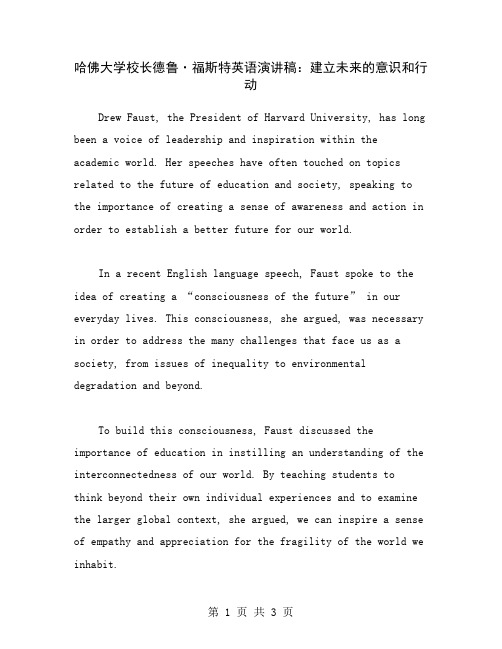
哈佛大学校长德鲁·福斯特英语演讲稿:建立未来的意识和行动Drew Faust, the President of Harvard University, has long been a voice of leadership and inspiration within the academic world. Her speeches have often touched on topics related to the future of education and society, speaking to the importance of creating a sense of awareness and action in order to establish a better future for our world.In a recent English language speech, Faust spoke to the idea of creating a “consciousness of the future” in our everyday lives. This consciousness, she argued, was necessary in order to address the many challenges that face us as a society, from issues of inequality to environmental degradation and beyond.To build this consciousness, Faust discussed the importance of education in instilling an understanding of the interconnectedness of our world. By teaching students tothink beyond their own individual experiences and to examine the larger global context, she argued, we can inspire a sense of empathy and appreciation for the fragility of the world we inhabit.Beyond education, Faust also encouraged individuals to take action in their own lives. She spoke to the importance of small, everyday choices, from deciding to recycle to making more sustainable choices as consumers. Through these small acts of commitment, she argued, we can collectively begin to shift the trajectory of our society towards a more positive future.Faust also spoke to the importance of collective action, highlighting the power of movements such as the recent global climate strikes as evidence of the potential for widespread mobilization. When individuals come together with a shared vision for the future, she argued, they can act as a powerful force for positive change.Finally, Faust emphasized the need for leadership in establishing a consciousness of the future. She spoke to the importance of public figures and those in positions of power to use their platforms to promote awareness and action, highlighting the role of Harvard as a leading institution in shaping a more sustainable and progressive future for our world.In closing, Faust encouraged her audience to embrace the challenge of creating a consciousness of the future, recognizing that the path towards a better world is a collective and ongoing journey. Through education, individual action, collective mobilization, and leadership, she argued, we can build a brighter and more sustainable future for generations to come.。
哈佛大学校长致辞
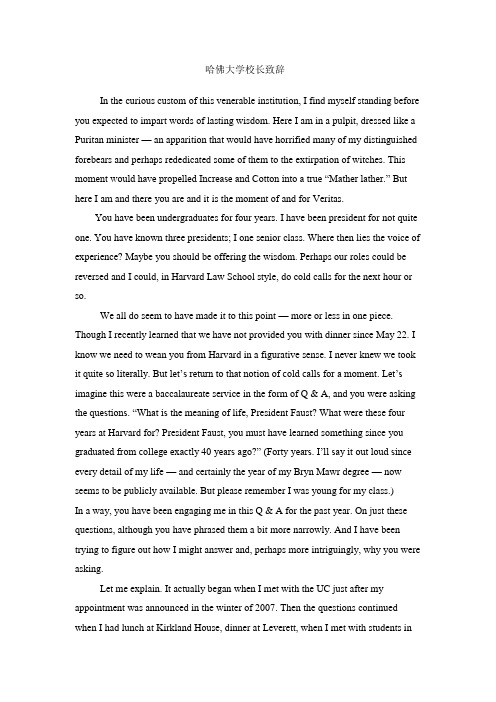
哈佛大学校长致辞In the curious custom of this venerable institution, I find myself standing before you expected to impart words of lasting wisdom. Here I am in a pulpit, dressed like a Puritan minister — an apparition that would have horrified many of my distinguished forebears and perhaps rededicated some of them to the extirpation of witches. This moment would have propelled Increase and Cotton into a true “Mather lather.” But here I am and there you are and it is the moment of and for Veritas.You have been undergraduates for four years. I have been president for not quite one. You have known three presidents; I one senior class. Where then lies the voice of experience? Maybe you should be offering the wisdom. Perhaps our roles could be reversed and I could, in Harvard Law School style, do cold calls for the next hour or so.We all do seem to have made it to this point — more or less in one piece. Though I recently learned that we have not provided you with dinner since May 22. I know we need to wean you from Harvard in a figurative sense. I never knew we took it quite so literally. But let’s return to that notion of cold calls for a moment. Let’s imagine this were a baccalaureate service in the form of Q & A, and you were asking the questions. “What is the meaning of life, President Faust? What were these four years at Harvard for? President Faust, you must have learned something since you graduated from college exactly 40 years ago?” (Forty years. I’ll say it out loud since every detail of my life — and certainly the year of my Bryn Mawr degree — now seems to be publicly available. But please remember I was young for my class.)In a way, you have been engaging me in this Q & A for the past year. On just these questions, although you have phrased them a bit more narrowly. And I have been trying to figure out how I might answer and, perhaps more intriguingly, why you were asking.Let me explain. It actually began when I met with the UC just after my appointment was announced in the winter of 2007. Then the questions continued when I had lunch at Kirkland House, dinner at Leverett, when I met with students inmy office hours, even with some recent graduates I encountered abroad. The first thing you asked me about wasn’t the curriculum or advising or f aculty contact or even student space. In fact, it wasn’t even alcohol policy. Instead, you repeatedly asked me: Why are so many of us going to Wall Street? Why are we going in such numbers from Harvard to finance, consulting, ibanking? There are a number of ways to think about this question and how to answer it. There is the Willie Sutton approach. You may know that when he was asked why he robbed banks, he replied, “Because that’s where the money is.” Professors Claudia Goldin and Larry Katz, whom many of you have encountered in your economics concentration, offer a not dissimilar answer based on their study of student career choices since the seventies. They find it notable that, given the very high pecuniary rewards in finance, many students nonetheless still choose to do something else. Indeed, 37 of you have signed on with Teach for America; one of you will dance tango and work in dance therapy in Argentina; another will be engaged in agricultural development in Kenya; another, with an honors degree in math, will study poetry; another will train as a pilot with the USAF; another will work to combat breast cancer. Numbers of you will go to law school, medical school, and graduate school. But, consistent with the pattern Goldin and Katz have documented, a considerable number of you are selecting finance and consulting. The Crimson’s survey of last year’s class reported that 58 percent of men and 43 percent of women entering the workforce made this choice. This year, even in challenging economic times, the figure is 39 percent.High salaries, the all but irresistible recruiting juggernaut, the reassurance for many of you that you will be in New York working and living and enjoying life alongside your friends, the promise of interesting work — there are lots of ways to explain these choices. For some of you, it is a commitment for only a year or two in any case. Others believe they will best be able to do good by first doing well. Yet, you ask me why you are following this path.I find myself in some ways less interested in answering your question than in figuring out why you are posing it. If Professors Goldin and Katz have it right; if finance is indeed the “rational choice,” why do you keep raising this issue with me?Why does this seemingly rational choice strike a number of you as not understandable, as not entirely rational, as in some sense less a free choice than a compulsion or necessity? Why does this seem to be troubling so many of you?You are asking me, I think, about the meaning of life, though you have posed your question in code — in terms of the observable and measurable phenomenon of senior career choice rather than the abstract, unfathomable and almost embarrassing realm of metaphysics. The Meaning of Life — capital M, capital L — is a cliché—easier to deal with as the ironic title of a Monty Python movie or the subject of a Simpsons episode than as a matter about which one would dare admit to harboring serious concern. But let’s for a moment abandon our Harvard savoir faire, o ur imperturbability, our pretense of invulnerability, and try to find the beginnings of some answers to your question.I think you are worried because you want your lives not just to be conventionally successful, but to be meaningful, and you are not sure how those two goals fit together. You are not sure if a generous starting salary at a prestigious brand name organization together with the promise of future wealth will feed your soul. But many of you are now wondering how these commitments fit with a career choice. Is it necessary to decide between remunerative work and meaningful work? If it were to be either/or, which would you choose? Is there a way to have both?You are asking me and yourselves fundamental questions about values, about trying to reconcile potentially competing goods, about recognizing that it may not be possible to have it all. You are at a moment of transition that requires making choices. And selecting one option — a job, a career, a graduate program — means not selecting others. Every decision means loss as well as gain — possibilities foregone as well as possibilities embraced. Your question to me is partly about that — about loss of roads not taken.Finance, Wall Street, “recruiting” have become the symbol of this dilemma, representing a set of issues that is much broader and deeper than just one career path. These are issues that in one way or another will at some point face you all — as you graduate from medical school and choose a specialty — family practice ordermatology, as you decide whether to use your law degree to work for a corporate firm or as a public defender, as you decide whether to stay in teaching after your two years with TFA. You are worried because you want to have both a meaningful life and a successful one; you know you were educated to make a difference not just for yourself, for your own comfort and satisfaction, but for the world around you. And now you have to figure out the way to make that possible.I think there is a second reason you are worried — related to but not entirely distinct from the first. You want to be happy. You have flocked to courses like “Positive Psychology” — Psych 1504 —and “The Science of Happiness” in search of tips. But how do we find happiness? I can offer one encouraging answer: get older. Turns out that survey data show older people — that is, my age — report themselves happier than do younger ones. But perhaps you don’t want to wait.As I have listened to you talk about the choices ahead of you, I have heard you articulate your worries about the relationship of success and happiness — perhaps, more accurately, how to define success so that it yields and encompasses real happiness, not just money and prestige. The most remunerative choice, you fear, may not be the most meaningful and the most satisfying. But you wonder how you would ever survive as an artist or an actor or a public servant or a high school teacher? How would you ever figure out a path by which to make your way in journalism? Would you ever find a job as an English professor after you finished who knows how many years of graduate school and dissertation writing?The answer is: you won’t know till you try. But if you don’t try to do what you love — whether it is painting or biology or fin ance; if you don’t pursue what you think will be most meaningful, you will regret it. Life is long. There is always time for Plan B. But don’t begin with it.I think of this as my parking space theory of career choice, and I have been sharing it with students for decades. Don’t park 20 blocks from your destination because you think you’ll never find a space. Go where you want to be and then circle back to where you have to be.You may love investment banking or finance or consulting. It might be just right for you. Or, you might be like the senior I met at lunch at Kirkland who had just returned from an interview on the West Coast with a prestigious consulting firm. “Why am I doing this?” she asked. “I hate flying, I hate hotels, I won’t like this job.” Find work you love. It is hard to be happy if you spend more than half your waking hours doing something you don’t.But what is ultimately most important here is that you are asking the question — not just of me but of yourselves. You are choosing roads and at the same time challenging your own choices. You have a notion of what you want your life to be and you are not sure the road you are taking is going to get you there. This is the best news. And it is also, I hope, to some degree, our fault. Noticing your life, reflecting upon it, considering how you can live it well, wondering how you can do good: These are perhaps the most valuable things that a liberal arts education has equipped you to do. A liberal education demands that you live self-consciously. It prepares you to seek and define the meaning inherent in all you do. It has made you an analyst and critic of yourself, a person in this way supremely equipped to take charge of your life and how it unfolds. It is in this sense that the liberal arts are liberal — as in liberare — to free. They empower you with the possibility of exercising agency, of discovering meaning, of making choices. The surest way to have a meaningful, happy life is to commit yourself to striving for it. Don’t settle. Be prepar ed to change routes. Remember the impossible expectations we have of you, and even as you recognize they are impossible, remember how important they are as a lodestar guiding you toward something that matters to you and to the world. The meaning of your life is for you to make.I can’t wait to see how you all turn out. Do come back, from time to time, and let us know.。
哈佛大学校长开学典礼致辞稿

致辞稿如下:欢迎,2021届的新生。
我很高兴在新生参观日跟你们很多人打过照面,我也很欣喜有1,702人选择在这里度过自己未来四年的时光。
你们代表着哈佛的现在和未来,欢迎你们。
你们现在开启了人生的新篇章,这个时刻不仅对你们自己意义重大,对美国和世界来说同样如此。
最近几周,我们感受到了全球核战争的威胁,我们目睹了极端天气的可怕,我们看到了发生在西班牙、芬兰、比利时和阿富汗的毁灭性恐怖主义行为,我们也听闻了美国一所大学城里令人心寒的仇恨、种族主义、反犹太主义和暴力事件,那个地方跟我们这里并无多大区别。
在这样的时刻,大学教育应该是什么样子?应该意味着什么?大学究竟是什么?在美国和世界进入如此充满挑战和不安定的时刻,我们如何看待大学的责任,也就是我们肩负的责任?首先,大学是关于知识和对真理的追寻。
我们信仰事实以及人类探知事实的能力。
我们坚信教育和学习是人类进步的手段,是民主政制的重要基础。
哈佛是一所研究型大学,这意味着哈佛的全体教员致力于在其广泛研究领域中积极拓展知识的边界。
当你们开始学习,你们也被邀请成为这趟探索之旅的一员,在教室和实验室,在图书馆和博物馆,还有在除此之外的广阔天地里。
你们最终可能会写出一篇毕业论文,就像去年大约四成毕业生所做的那样。
你们可能对一个项目产生兴趣,对一个问题展开独立研究。
或者,你们也许会在夏天的时候加入本科生研究项目,跟其他学生研究员一起住在校园,同时跟教员密切合作,在科学和工程学领域,在社会科学领域,在市场、组织、社群参与和全球健康领域,在人文和艺术领域,一起探索新知。
我们认为,追寻真理需要持续的验证和重新评估,需要不断的论证、挑战和辩论。
我们非常自信地认为,我们已经取得了一定的成功。
真理既是愿望,也是灵感。
我们知道对知识的探索永无止境,所以我们必须对新的想法、新的观点以及犯错的可能性持开放态度。
这就要求我们具备勇敢、宽容和谦逊的品质,愿意参与到知识社群的辩论,愿意包容他人的想法,并愿意基于理性和证据改变自己的观点。
美国哈佛大学校长德鲁。福斯特就职演讲词

美国哈佛大学校长德鲁。
福斯特就职演讲词第一篇:美国哈佛大学校长德鲁。
福斯特就职演讲词美国哈佛大学校长德鲁·福斯特就职演讲词放飞我们最富挑战性的想象力(2007年10月12日)哈佛大学校长德鲁·福斯特就职演讲常常会罗列一些新校长的具体构想或是计划。
但是,当我在考虑今天意味着什么的时候,这样的罗列似乎过于束缚人,它们限制了而不是去放飞我们最富挑战性的想象力,限制了我们去思考我们最深远的责任和义务。
如果今天是超越普通日子的一天,如果今天是我们为数不多的、不仅是作为哈佛人聚集在一起、而是与一个更为广阔的学术、教学与学问的世界站在一起的一天,那么,现在就是哈佛以及像哈佛这类大学去思考的时候了:在这21世纪的第一个十年中,我们应该扮演什么样的角色。
大学的确是要承担责任的。
但我们从事高等教育的人需要首先搞清楚,我们为了什么去承担责任。
人们要求我们报告毕业率、研究生院的入学统计数字、标准考试的分数,目的是为了在大学评价中提高“附加值”,人们要看研究经费有多少,教师出版和发表论著的数量是多少。
但这些硬性指标本身并不能说明所取得的成就,更不要提大学所渴望达到的目标了。
虽然了解上述指标很重要,它们也可以说明我们事业中一些特别的部分内容。
但我们的目的要比这些宏大得多,因此,要解释我们的责任感,也更加困难。
那么,让我斗胆提出一个定义来吧。
一所大学的精神所在,是它要特别对历史和未来负责——而不单单或着仅仅是对现在负责。
一所大学关乎学问(learning),影响终生的学问,将传统传承千年的学问,创造未来的学问。
一所大学,既要回头看,也要向前看,其看的方法必须——也应该——与大众当下所关心的或是所要求的相对立。
大学是要对永恒做出承诺,而这些投资会产生我们无法预测且常常是无法衡量的收益。
大学是那些活生生的传统的管理员——在Widener 图书馆与Houghton图书馆以及我们另外的88个图书馆,在Fogg与Peabody博物馆,在我们的古典学科的系科,在历史与文学的系科,都有活生生的传统。
哈佛新校长大学演讲稿

大家好!非常荣幸能在这里,作为哈佛大学的新校长,发表我的就职演讲。
首先,我要感谢哈佛大学对我的信任,让我有机会为这所伟大的学府服务。
今天,我想和大家分享一些关于哈佛、关于教育、关于未来的思考。
一、哈佛的传承与使命哈佛大学成立于1636年,至今已有近400年的历史。
在这漫长的岁月里,哈佛一直秉承着“为全人类服务”的使命,培养了无数优秀的人才。
从美国独立战争时期的政治家,到现代的科技巨擘,再到各行各业的杰出代表,哈佛人都以卓越的成就为世界作出了巨大贡献。
作为哈佛校长,我深感责任重大。
我们要继续传承哈佛的优良传统,弘扬哈佛精神,让哈佛成为全球高等教育的一面旗帜。
同时,我们也要勇敢面对时代挑战,不断改革创新,为世界培养更多具有全球视野、社会责任感和创新精神的优秀人才。
二、教育的本质与未来教育,是人类文明进步的基石。
在全球化、信息化时代,教育的本质并未改变,依然是培养人才、传承文化、推动社会进步。
然而,随着科技的发展和社会的变迁,教育的内涵和外延都在不断拓展。
首先,教育要注重培养学生的综合素质。
在知识爆炸的今天,单纯追求分数已经无法满足社会需求。
我们要关注学生的身心健康、道德品质、创新能力和实践能力,培养他们成为具有全面素质的复合型人才。
其次,教育要注重培养学生的全球视野。
在全球化的背景下,各国之间的交流与合作日益紧密。
我们要让学生了解世界,关注世界,培养他们的国际视野和跨文化交流能力。
再次,教育要注重培养学生的社会责任感。
作为一名哈佛人,我们要时刻牢记社会责任,关注社会发展,为世界和平、繁荣、进步贡献自己的力量。
未来,教育将面临以下挑战:1. 技术变革带来的冲击。
人工智能、大数据等新技术的发展,将深刻改变教育的形态。
我们要积极拥抱技术,创新教育模式,让教育更加高效、个性化。
2. 全球竞争带来的压力。
各国对人才的争夺日益激烈,我们要培养具有全球竞争力的人才,为我国在国际舞台上发挥更大作用。
3. 社会问题带来的挑战。
哈佛大学校长德鲁-福斯特在哈佛毕业典礼上的演讲
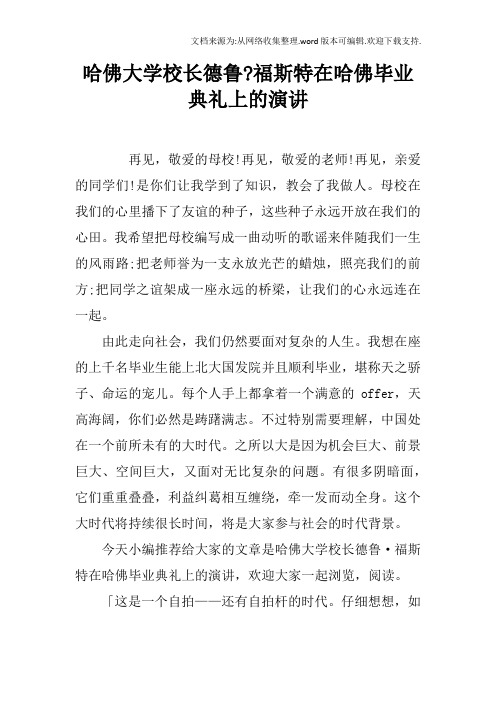
哈佛大学校长德鲁?福斯特在哈佛毕业典礼上的演讲再见,敬爱的母校!再见,敬爱的老师!再见,亲爱的同学们!是你们让我学到了知识,教会了我做人。
母校在我们的心里播下了友谊的种子,这些种子永远开放在我们的心田。
我希望把母校编写成一曲动听的歌谣来伴随我们一生的风雨路;把老师誉为一支永放光芒的蜡烛,照亮我们的前方;把同学之谊架成一座永远的桥梁,让我们的心永远连在一起。
由此走向社会,我们仍然要面对复杂的人生。
我想在座的上千名毕业生能上北大国发院并且顺利毕业,堪称天之骄子、命运的宠儿。
每个人手上都拿着一个满意的offer,天高海阔,你们必然是踌躇满志。
不过特别需要理解,中国处在一个前所未有的大时代。
之所以大是因为机会巨大、前景巨大、空间巨大,又面对无比复杂的问题。
有很多阴暗面,它们重重叠叠,利益纠葛相互缠绕,牵一发而动全身。
这个大时代将持续很长时间,将是大家参与社会的时代背景。
今天小编推荐给大家的文章是哈佛大学校长德鲁·福斯特在哈佛毕业典礼上的演讲,欢迎大家一起浏览,阅读。
「这是一个自拍——还有自拍杆的时代。
仔细想想,如果社会里的每个人都开始过上整天自拍的生活,这会是怎样一个社会呢?对于我来说,那也许是“利己主义”最真实的写照了。
我们无休止地关注我们自己、我们的形象、我们得到的“赞”,不停地进行“自我放大”。
我也知道,你们这几年也有许多美好的记忆:信息院里,有你们又怕又爱、面冷心慈、批评起人来连男生也会哭的“吴奶奶”——吴同茂老师;湘雅医学院里,有熟悉临床八年制学生各种详细信息、生病也要为同学们办好毕业庆祝晚会的辅导员——丁红珊“老大姐”;铁道校区学生3舍里,有同学们遇到困难就愿意和他聊一聊的宿管员李发强师傅;升华公寓25栋里,有被同学们称为知心朋友、贴心哥哥的85后楼管“杨帅哥”;机电院里,有傲立风雨中,直言“我的课讲得好”,“我不服”的汤老师,等等。
这些普通的老师和职工一直关心着你们、爱着你们!最后,我们在抓好期末复习的同时,每一位同学应一如既往地遵守好学校的课堂常规,做到上课不说话,不做小动作。
比尔盖茨在哈佛大学演讲(中英对照版)
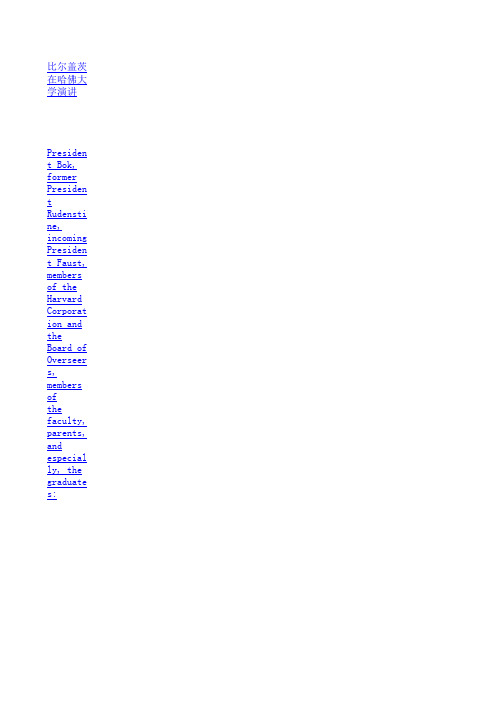
比尔盖茨在哈佛大学演讲President Bok, former President Rudenstine, incoming President Faust,members of the Harvard Corporation and the Board of Overseers, members ofthe faculty, parents, and especially, the graduates:尊敬的Bok校长,Rudenstine前校长,即将上任的Faust校长,哈佛集团的各位成员,监管理事会的各位I've been waiting more than 30 years to say this: "Dad, I always told youI'd come back and get my degree."有一句话我等了三十年,现在终于可以说了:“老爸,我总是跟你说,我会回来拿到我的学位的!”I want to thank Harvard for this timely honor. I'll be changing my job nextyear … and it will be nice to finally have a college degree on my resume.我要感谢哈佛大学在这个时候给我这个荣誉。
明年,我就要换工作了(注:指从微软公司退休)……我I applaud the graduates today for taking a much more direct route to yourdegrees. For my part, I'm just happy that the Crimson has called meHarvard's most successful dropout. I guess that makes me valedictorian ofmy own special class … I did the best of everyone who failed.我为今天在座的各位同学感到高兴,你们拿到学位可比我简单多了。
哈佛大学校长在北京大学演讲:如何造就一流大学(中文版)
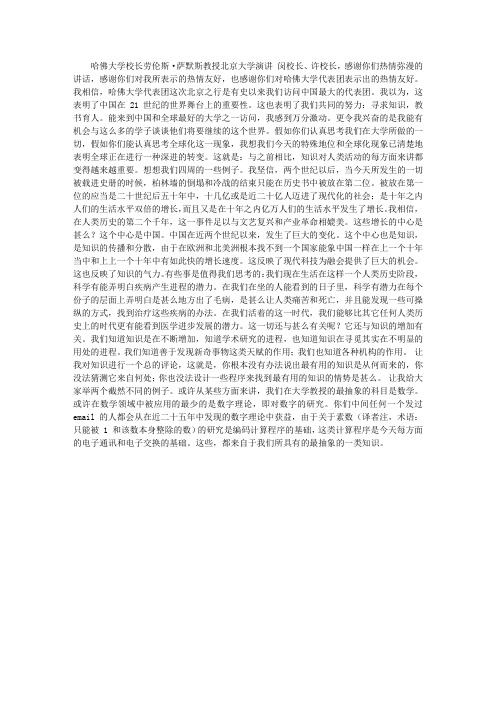
哈佛大学校长劳伦斯·萨默斯教授北京大学演讲闵校长、许校长,感谢你们热情弥漫的讲话,感谢你们对我所表示的热情友好,也感谢你们对哈佛大学代表团表示出的热情友好。
我相信,哈佛大学代表团这次北京之行是有史以来我们访问中国最大的代表团。
我以为,这表明了中国在 21 世纪的世界舞台上的重要性。
这也表明了我们共同的努力:寻求知识,教书育人。
能来到中国和全球最好的大学之一访问,我感到万分激动。
更令我兴奋的是我能有机会与这么多的学子谈谈他们将要继续的这个世界。
假如你们认真思考我们在大学所做的一切,假如你们能认真思考全球化这一现象,我想我们今天的特殊地位和全球化现象已清楚地表明全球正在进行一种深进的转变。
这就是:与之前相比,知识对人类活动的每方面来讲都变得越来越重要。
想想我们四周的一些例子。
我坚信,两个世纪以后,当今天所发生的一切被载进史册的时候,柏林墙的倒塌和冷战的结束只能在历史书中被放在第二位。
被放在第一位的应当是二十世纪后五十年中,十几亿或是近二十亿人迈进了现代化的社会;是十年之内人们的生活水平双倍的增长,而且又是在十年之内亿万人们的生活水平发生了增长。
我相信,在人类历史的第二个千年,这一事件足以与文艺复兴和产业革命相媲美。
这些增长的中心是甚么?这个中心是中国。
中国在近两个世纪以来,发生了巨大的变化。
这个中心也是知识,是知识的传播和分散,由于在欧洲和北美洲根本找不到一个国家能象中国一样在上一个十年当中和上上一个十年中有如此快的增长速度。
这反映了现代科技为融会提供了巨大的机会。
这也反映了知识的气力。
有些事是值得我们思考的:我们现在生活在这样一个人类历史阶段,科学有能弄明白疾病产生进程的潜力。
在我们在坐的人能看到的日子里,科学有潜力在每个份子的层面上弄明白是甚么地方出了毛病,是甚么让人类痛苦和死亡,并且能发现一些可操纵的方式,找到治疗这些疾病的办法。
在我们活着的这一时代,我们能够比其它任何人类历史上的时代更有能看到医学进步发展的潜力。
- 1、下载文档前请自行甄别文档内容的完整性,平台不提供额外的编辑、内容补充、找答案等附加服务。
- 2、"仅部分预览"的文档,不可在线预览部分如存在完整性等问题,可反馈申请退款(可完整预览的文档不适用该条件!)。
- 3、如文档侵犯您的权益,请联系客服反馈,我们会尽快为您处理(人工客服工作时间:9:00-18:30)。
Installation address: Unleashing our most ambitious imaginings Cambridge, Mass.Oct. 12, 2007I stand honored by your trust, inspired by your charge. I am grateful to the Governing Boards for their confidence, and I thank all of you for gathering in these festival rites. I am indebted to my three predecessors, sitting behind me, for joining me today. But I am grateful to them for much more – for all that they have given to Harvard and for what each of them has generously given to me – advice, wisdom, support. I am touched by the greetings from staff, faculty, students, alumni, universities, from our honorable Governor, and from the remarkable John Hope Franklin, who has both lived and written history. I am grateful to the community leaders from Boston and Cambridge who have come to welcome their new neighbor. I am a little stunned to see almost every person I am related to on earth sitting in the front rows. And I would like to offer a special greeting of my own to my teachers who are here –teachers from grade school, high school, college and graduate school –who taught me to love learning and the institutions that nurture it.We gather for a celebration a bit different from our June traditions. Commencement is an annual rite of passage for thousands of graduates; today marks a rite of passage for the University. As at Commencement, we don robes that mark our ties to the most ancient traditions ofscholarship. On this occasion, however, our procession includes not just our Harvard community, but scholars – 220 of them – representing universities and colleges from across the country and around the world. I welcome and thank our visitors, for their presence reminds us that what we do here today, and what we do at Harvard every day, links us to universities and societies around the globe.Today we mark new beginnings by gathering in solidarity; we celebrate our community and its creativity; we commit ourselves to Harvard and all it represents in a new chapter of its distinguished history. Like a congregation at a wedding, you signify by your presence a pledge of support for this marriage of a new president to a venerable institution. As our colleagues in anthropology understand so well, rituals have meanings and purposes; they are intended to arouse emotions and channel intentions. In ritual, as the poet Thomas Lynch has written, “We act out things we can not put into words.” But now my task is in fact to put some of this ceremony into words, to capture our meanings and purposes. Inaugural speeches are a peculiar genre. They are by definition pronouncements by individuals who don’t yet know what they are t alking about. Or, we might more charitably dub them expressions of hope unchastened by the rod of experience.A number of inaugural veterans – both orators and auditors – have proffered advice, including unanimous agreement that my talk must beshorter th an Charles William Eliot’s – which ran to about an hour and a half. Often inaugural addresses contain lists –of a new president’s specific goals or programs. But lists seem too constraining when I think of what today should mean; they seem a way of limiting rather than unleashing our most ambitious imaginings, our profoundest commitments.If this is a day to transcend the ordinary, if it is a rare moment when we gather not just as Harvard, but with a wider world of scholarship, teaching and learning, it is a time to reflect on what Harvard and institutions like it mean in this first decade of the 21st century.Yet as I considered how to talk about higher education and the future, I found myself – historian that I am – returning to the past and, in particular, to a document I encountered in my first year of graduate school. My cousin Jack Gilpin, Class of ’73, read a section of it at Memorial Church this morning. As John Winthrop sat on board the ship Arbella in 1630, sailing across the Atlantic to found the Massachusetts Bay Colony, he wrote a charge to his band of settlers, a charter for their new beginnings. He offered what he considered “a compass to steer by” –a “model,” but not a set of explicit orders. Winthrop instead sought to focus his followers on the broader significance of their project, on the spirit in which they should undertake their shared work. I aim to offer such a “compass” today, one for us at Harvard, and one that I hope willhave meaning for all of us who care about higher education, for we are inevitably, as Winthrop urged his settlers to be, “knitt together in this work as one.”American higher education in 2007 is in a state of paradox – at once celebrated and assailed. A host of popular writings from the 1980s on have charged universities with teaching too little, costing too much, coddling professors and neglecting students, embracing an “illiberalism” that has silenced open debate. A PBS special in 2005 described a “sea of mediocrity” that “places this nation at risk.” A report i ssued by the U.S. Department of Education last year warned of the “obsolescence” of higher education as we know it and called for federal intervention in service of the national interest.Yet universities like Harvard and its peers, those represented by so many of you here today, are beloved by alumni who donate billions of dollars each year, are sought after by students who struggle to win admission, and, in fact, are deeply revered by the American public. In a recent survey, 93 percent of respondents con sidered our universities “one of [the country’s] most valuable resources.” Abroad, our universities are admired and emulated; they are arguably the American institution most respected by the rest of the world.How do we explain these contradictions? Is American higher education in crisis, and if so, what kind? What should we as its leaders andrepresentatives be doing about it? This ambivalence, this curiouslove-hate relationship, derives in no small part from our almost unbounded expectations of our colleges and universities, expectations that are at once intensely felt and poorly understood.From the time of its founding, the United States has tied its national identity to the power of education. We have long turned to education to prepare our citizens for the political equality fundamental to our national self-definition. In 1779, for example, Thomas Jefferson called for a national aristocracy of talent, chosen “without regard to wealth, birth, or other accidental condition or circumstance” and “rendere d by liberal education ... able to guard the sacred deposit of the rights and liberties of their fellow-citizens.” As our economy has become more complex, more tied to specialized knowledge, education has become more crucial to social and economic mobility. W.E.B. DuBois observed in 1903 that “Education and work are the levers to lift up a people.” Education makes the promise of America possible.In the past half century, American colleges and universities have shared in a revolution, serving as both the emblem and the engine of the expansion of citizenship, equality and opportunity – to blacks, women, Jews, immigrants, and others who would have been subjected to quotas or excluded altogether in an earlier era. My presence here today – and indeed that of many others on this platform – would have beenunimaginable even a few short years ago. Those who charge that universities are unable to change should take note of this transformation, of how different we are from universities even of the mid 20th century. And those who long for a lost golden age of higher education should think about the very limited population that alleged utopia actually served. College used to be restricted to a tiny elite; now it serves the many, not just the few. The proportion of the college age population enrolled in higher education today is four times what it was in 1950; twelve times what it was before the 1920s. Ours is a different and a far better world.At institutions like Harvard and its peers, this revolution has been built on the notion that access should be based, as Jefferson urged, on talent, not circumstance. In the late 1960s, Harvard began sustained efforts to identify and attract outstanding minority students; in the 1970s, it gradually removed quotas limiting women to a quarter of the entering college class. Recently, Harvard has worked hard to send the message that the college welcomes families from across the economic spectrum. As a result we have seen in the past 3 years a 33 percent increase in students from famili es with incomes under $60,000. Harvard’s dorms and Houses are the most diverse environments in which many of our students will ever live.Yet issues of access and cost persist – for middle-class families who suffer terrifying sticker shock, and for graduate and professional students,who may incur enormous debt as they pursue service careers in fields where salaries are modest. As graduate training comes to seem almost as indispensable as the baccalaureate degree for mobility and success, the cost of these programs takes on even greater importance.The desirability and the perceived necessity of higher education have intensified the fears of many. Will I get in? Will I be able to pay? This anxiety expresses itself in both deep-seated resentment and nearly unrealizable expectations. Higher education cannot alone guarantee the mobility and equality at the heart of the American Dream. But we must fully embrace our obligation to be available and affordable. We must make sure that talented students are able to come to Harvard, that they know they are able to come, and that they know we want them here. We need to make sure that cost does not divert students from pursuing their passions and their dreams.But American anxiety about higher education is about more than just cost. The deeper problem is a widespread lack of understanding and agreement about what universities ought to do and be. Universities are curious institutions with varied purposes that they have neither clearly articulated nor adequately justified. Resulting public confusion, at a time when higher education has come to seem an indispensable social resource, has produced a torrent of demands for greater “accountability” from colleges and universities.Universities are indeed accountable. But we in higher education need to seize the initiative in defining what we are accountable for. We are asked to report graduation rates, graduate school admission statistics, scores on standardized tests intended to assess the “value added” of years in college, research dollars, numbers of faculty publications. But such measures cannot themselves capture the achievements, let alone the aspirations of universities. Many of these metrics are important to know, and they shed light on particular parts of our undertaking. But our purposes are far more ambitious and our accountability thus far more difficult to explain.Let me venture a definition. The essence of a university is that it is uniquely accountable to the past and to the future – not simply or even primarily to the present. A university is not about results in the next quarter; it is not even about who a student has become by graduation. It is about learning that molds a lifetime, learning that transmits the heritageof millennia; learning that shapes the future. A university looks both backwards and forwards in ways that must – that even ought to – conflict with a public’s immediate concerns or demands. Universities make commitments to the timeless, and these investments have yields we cannot predict and often cannot measure. Universities are stewards of living tradition – in Widener and Houghton and our 88 other libraries, in the Fogg and the Peabody, in our departments of classics, of history and of literature. We are uncomfortable with efforts to justify these endeavorsby defining them as instrumental, as measurably useful to particular contemporary needs. Instead we pursue them in part “for their own sake,” because they define what has over centuries made us human, not because they can enhance our global competitiveness.We pursue them because they offer us as individuals and as societies a depth and breadth of vision we cannot find in the inevitably myopic present. We pursue them too because just as we need food and shelter to survive, just as we need jobs and seek education to better our lot, so too we as human beings search for meaning. We strive to understand who we are, where we came from, where we are going and why. For many people, the four years of undergraduate life offer the only interlude permitted for unfettered exploration of such fundamental questions. But the search for meaning is a never-ending quest that is always interpreting, always interrupting and redefining the status quo, always looking, never content with what is found. An answer simply yields the next question. This is in fact true of all learning, of the natural and social sciences as well as the humanities, and thus of the very core of what universities are about.By their nature, universities nurture a culture of restlessness and even unruliness. This lies at the heart of their accountability to the future. Education, research, teaching are always about change – transforming individuals as they learn, transforming the world as our inquiries alter our understanding of it, transforming societies as we see our knowledgetranslated into policies – policies like those being developed at Harvard to prevent unfair lending practices, or to increase affordable housing or avert nuclear proliferation – or translated into therapies, like those our researchers have designed to treat macular degeneration or to combat anthrax. The expansion of knowledge means change. But change is often uncomfortable, for it always encompasses loss as well as gain, disorientation as well as discovery. It has, as Machiavelli once wrote, no constituency. Yet in facing the future, universities must embrace the unsettling change that is fundamental to every advance in understanding. We live in the midst of scientific developments as dramatic as those of any era since the 17th century. Our obligation to the future demands that we take our place at the forefront of these transformations. We must organize ourselves in ways that enable us fully to engage in such exploration, as we have begun to do by creating the Broad Institute, by founding cross school departments, by launching a School of Engineering and Applied Sciences. We must overcome barriers both within and beyond Harvard that could slow or constrain such work, and we must provide the resources and the facilities – like the new science buildings in both Cambridge and Allston – to support it. Our obligation to the future makes additional demands. Universities are, uniquely, a place of philosophers as well as scientists. It is urgent that we pose the questions of ethics and meaning that will enable us to confront the human, thesocial and the moral significance of our changing relationship with the natural world.Accountability to the future requires that we leap geographic as well as intellectual boundaries. Just as we live in a time of narrowing distances between fields and disciplines, so we inhabit an increasingly transnational world in which knowledge itself is the most powerful connector. Our lives here in Cambridge and Boston cannot be separated from the future of the rest of the earth: we share the same changing climate; we contract and spread the same diseases; we participate in the same economy. We must recognize our accountability to the wider world, for, as John Winthrop warned in 1630, “we must consider that we shall be as a city upon a hill. The eyes of all people are upon us.”Harvard is both a source and a symbol of the ever expanding knowledge upon which the future of the earth depends, and we must take an active and reflective role in this new geography of learning. Higher education is burgeoning around the globe in forms that are at once like and unlike our own. American universities are widely emulated, but our imitators often display limited appreciation for the principles of free inquiry and the culture of creative unruliness that defines us.The “Veritas” in Harvard’s shield was originally intended to invoke the absolutes of divine revelation, the unassailable verities of Puritan religion. We understand it quite differently now. Truth is an aspiration, not apossession. Yet in this we – and all universities defined by the spirit of debate and free inquiry – challenge and even threaten those who would embrace unquestioned certainties. We must commit ourselves to the uncomfortable position of doubt, to the humility of always believing there is more to know, more to teach, more to understand.The kinds of accountability I have described represent at once a privilege and a responsibility. We are able to live at Harvard in a world of intellectual freedom, of inspiring tradition, of extraordinary resources, because we are part of that curious and venerable organization known as a university. We need better to comprehend and advance its purposes –not simply to explain ourselves to an often critical public, but to hold ourselves to our own account. We must act not just as students and staff, historians and computer scientists, lawyers and physicians, linguists and sociologists, but as citizens of the university, with obligations to this commonwealth of the mind. We must regard ourselves as accountable to one another, for we constitute the institution that in turn defines our possibilities. Accountability to the future encompasses special accountability to our students, for they are our most important purpose and legacy. And we are responsible not just to and for this university, Harvard, in this moment, 2007, but to the very concept of the university as it has evolved over nearly a millennium.It is not easy to convince a nation or a world to respect, much less support, institutions committed to challenging society’s fundamental assumptions. But it is our obligation to make that case: both to explain our purposes and achieve them so well that these precious institutions survive and prosper in this new century. Harvard cannot do this alone. But all of us know that Harvard has a special role. That is why we are here; that is why it means so much to us.Last week I was given a brown manila envelope that had been entrusted to the University Archives in 1951 by James B. Conant, Harvard’s 23rd president. He left instructions that it should be opened by the Harvard president at the outset of the next century “and not before.” I broke the seal on the mysterious package to find a remarkable letter from my predecessor. It was addressed to “My dear Sir.” Conant wrote with a sense of imminent danger. He feared an impending World War III that would make “the destruction of our cities includ ing Cambridge quite possible.”“We all wonder,” he continued, “how the free world is going to get through the next fifty years.” But as he imagined Harvard’s future, Conant shifted from foreboding to faith. If the “prophets of doom” proved wrong, if there was a Harvard president alive to read his letter, Conant was confident about what the university would be. “You will receive this note and be in charge of a more prosperous and significant institutionthan the one over which I have the honor to preside ... That ... [Harvard] will maintain the traditions of academic freedom, of tolerance for heresy, I feel sure.” We must dedicate ourselves to making certain he continuesto be right; we must share and sustain his faith.Conant’s letter, like our gathering he re, marks a dramatic intersection of the past with the future. This is a ceremony in which I pledge – with keys and seal and charter – my accountability to the traditions that his voice from the past invokes. And at the same time, I affirm, in compact with all of you, my accountability to and for Harvard’s future. As in Conant’s day, we face uncertainties in a world that gives us sound reason for disquiet. But we too maintain an unwavering belief in the purposes and potential of this university and in all it can do to shape how the world will look another half century from now. Let us embrace those responsibilities and possibilities; let us share them “knitt together . . . as one;” let us take up the work joyfully, for such an assignment is a privilege beyond measure.就职演讲常常会罗列一些新校长的具体构想或是计划。
